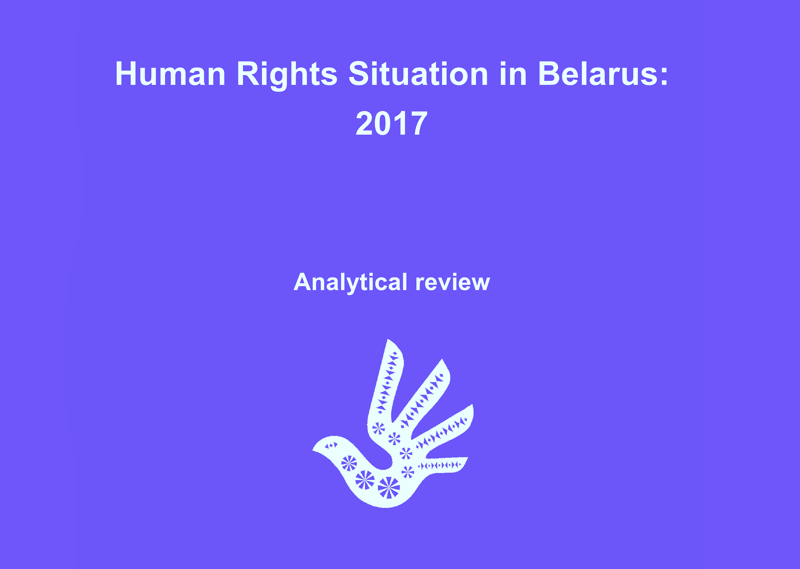Human Rights Situation in Belarus: 2017. Analytical Review
https://spring96.org./en/news/88849
2018
2018-01-17T16:28:07+0300
2018-01-17T16:28:07+0300
2018-01-17T16:30:58+0300
en
https://spring96.org./files/images/sources/review_2017_en_vokladka_2.png
The Human Rights Center “Viasna”
The Human Rights Center “Viasna”
The Human Rights Center “Viasna”
The Human Rights Center “Viasna”
SUMMARY
- the year was marked by a significant deterioration in the overall situation of human rights in the country as compared to the previous period of so-called ‘soft practices’, which began in August 2015 and ended with the start of mass protests in February 2017; the latter were in many ways provoked by the use of Presidential Decree number 3;
- the wave of demonstrations swept across many cities of the country to protest against the application of Decree number 3, which were viewed by the authorities as a serious threat to domestic political situation and led to large-scale repression against the protesters, activists and opposition leaders, independent journalists and human rights defenders. In March 2017, a total of 900 people were subjected to various forms of repression, according to the Human Rights Center "Viasna" (including participants in the rally held on March 25 in Minsk). In total, according to Viasna’s estimates, in 2017, there were more than 600 cases of administrative prosecution in connection with the exercise of freedoms of peaceful assembly and expression; in more than 250 cases, judges ordered administrative detention as a form of punishment;
- during 2017, the authorities actively practiced politically motivated judicial harassment. According to the Human Rights Center "Viasna", this kind of repression was used against 40 people. 35 of them were arrested on March 21-24 and held in pre-trial detention on charges of ‘preparing riots’. Later, 16 persons faced an additional charge under Art. 287 of the Criminal Code (creating an illegal armed group). Of particular concern is the ongoing criminal case against activists of the independent trade union REP Henadz Fiadynich and Ihar Komlik (Part 2, Art. 243 of the Criminal Code, large-scale tax evasion);
- the year was marred by numerous cases of harassment of journalists working with independent media in connection with the exercise of their professional activities. According to BAJ, there were 69 cases of administrative prosecution of journalists, mainly sentenced to fines for cooperation with foreign media;
- the authorities released almost all persons earlier involved in criminal cases, and the majority of criminal cases were closed, which suggests that foreign policy and geopolitical factors continued to exert a significant influence on the political situation in the country, including the human rights situation. Despite the deterioration of the overall situation in the country during the spring events, the government continued its efforts to continue the dialogue and normalization of relations with the West (EU and US);
- as of end of 2017, the country’s prisons continued to hold two political prisoners, Mikhail Zhamchuzhny and Amnesty International’s prisoner of conscience Dzmitry Paliyenka;
- despite the continuation of the dialogue with the EU and the PACE on the issue of the death penalty and repeated calls for a moratorium on executions, Belarus continued to use this kind of punishment. In 2017, three new death sentences were handed down, and one man was executed;
- there were no systemic changes in the area of civil and political rights at the legislative level, while the widely announced reform of the law “On Mass Events” failed to change the restrictive essence of the law and its implementation. The authorities also failed to implement the OSCE ODIHR recommendations to amend the electoral law.
Human Rights Situation in Belarus: 2017. Analytical Review


















